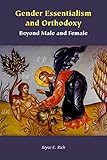Gender Essentialism and Orthodoxy: Beyond Male and Female
Material type: TextSeries: Orthodox Christianity and Contemporary ThoughtPublication details: New York Fordham University Press 2023Description: 258p 24 cmContent type:
TextSeries: Orthodox Christianity and Contemporary ThoughtPublication details: New York Fordham University Press 2023Description: 258p 24 cmContent type: - text
- unmediated
- volume
- 9781531501532
- C55 23/eng/20230428 R370
| Item type | Current library | Call number | Status | Date due | Barcode | |
|---|---|---|---|---|---|---|
 Books
Books
|
DVK Library Stack -> First Floor -> C | C55 R370 (Browse shelf(Opens below)) | Available | 11079681 |
Browsing DVK Library shelves, Shelving location: Stack -> First Floor -> C Close shelf browser (Hides shelf browser)
| No cover image available | No cover image available |

|

|

|

|

|
||
| C55 P537 Theosis and Mission : | C55 P537 Theosis and Mission : | C55 P713 In the World, of the Church | C55 R370 Gender Essentialism and Orthodoxy: Beyond Male and Female | C55 R665 Into All the World | C55 St249 Experience of God | C55 T158 Ortodoks Kilisesi` nin Sutunu Suruclu Suryani Mor Yakup |
Includes bibliographical references (pages 233-254) and index.
Subject(s): Sex -- Religious aspects -- Orthodox Eastern Church | Sex role -- Religious aspects -- Orthodox Eastern Church | Theological anthropology
"Within contemporary orthodoxy, debates over sex and gender have become increasingly polemical over the past generation. Beginning with questions around women's ordination, arguments have expanded to include feminism, sexual orientation, the sacrament of marriage, definitions of family, adoption of children, and care of transgender individuals. Preliminary responses to each of these topics are shaped by gender essentialism, the idea that male and female are ontologically fixed and incommensurate categories with different sets of characteristics and gifts for each sex. These categories, in turn, delineate gender roles in the family, the church, and society. Gender Essentialism and Orthodoxy offers an immanent critique of gender essentialism in the stream of the contemporary Orthodox Church influenced by the "Paris School" of Russian émigré theologians and their heirs. It uses an interdisciplinary approach to bring into conversation patristic reflections on sex and gender, personalist theological anthropology, insights from gender and queer theory, and modern biological understandings of human sexual differentiation. Though these are seemingly unrelated discourses, Gender Essentialism and Orthodoxy reveals unexpected points of convergence, as each line of thought eschews a strict gender binary in favor of more open-ended possibilities. The study concludes by drawing out some theological implications of the preceding findings as they relate to the ordination of women to the priesthood, same-sex unions and sacramental understandings of marriage, definitions of family, and pastoral care for intersex, transgender, and nonbinary parishioners"-- Provided by publisher.
There are no comments on this title.
